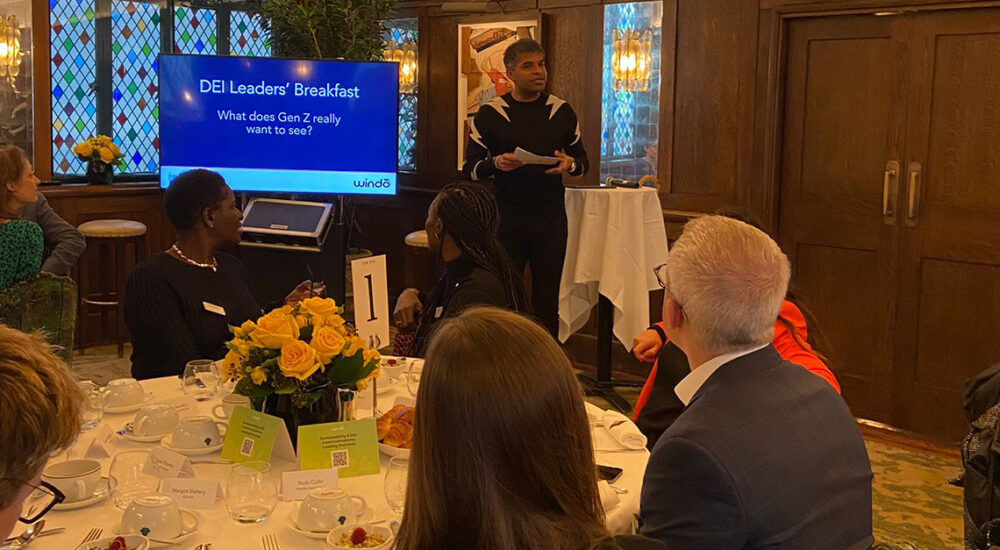In a world dominated by digital natives, understanding and meeting the expectations of Gen Z is crucial for businesses striving to attract and retain top talent. Insights from a recent DEI Leaders Breakfast, hosted by INvolve and Windō, shed light on the priorities and strategies essential for success in 2024. Let’s explore the key takeaways that provide valuable insights into aligning with Gen Z’s expectations.
Externalize DEI efforts for recruitment success
Companies are doing DEI work to varying degrees, but they are not all choosing not to externalize this. While this is likely a result of the current and prevalent anti-DEI sentiment, a strong DEI infrastructure and the work being done to improve businesses must be externalized. Not only does this cut through the anti-DEI noise but it will ultimately separate the businesses that are meeting pledges with action and those that are choosing to be silent or passive in their approach. As stated in Windō’s research, 86% of young leaders look at company websites for insights into DEI and sustainability efforts when they are scouting potential employers, therefore externalizing DEI work enables organizations to better recruit and attract this new generation of talent.
Prioritize progress over perfection
When looking for employers that align with their values, Gen Z are not looking for perfection, but they are looking for evidence of tangible progress. Businesses on the other hand are often reluctant to be transparent about their targets and goals for DEI due to the fear that this paints a less than exemplary picture around their current levels of diversity and/or inclusive practices. Gen Z are less concerned about the faults that businesses have and are keen to see transparent action plans to solve these problems, thus this creates another need for businesses to be open and honest about their progress plans rather than fixating on not being perfect yet.
Pushing the dialogue: strategies for DEI advancement
Some strategies that have helped to advance DEI conversations and sentiment within businesses are assessing suppliers and external partnerships and working to determine whether these align with a company’s values. Other efforts include embedding action into departmental targets and practical business initiatives that move DEI from a nice-to-have into an integral business component.
Key focus areas: transparency in inclusion
Transparency around LGBTQ+ inclusion, socio-economic diversity and neurodiversity in business are expected to increase. While this will exist for race and gender too, the upward curve will be gentler. With socio-economic mobility particularly, companies are beginning to ask questions within employee Self-ID surveys that are used to analyze workplace representation from entry to senior level, which informs targets and action plans for progress across these levels.
Neurodiversity
Business managers on the whole are struggling to manage and build a better understanding around supporting neurodivergent colleagues in the workplace. With an increase in employee awareness, dialogue, and slow de-stigmatization of neurodivergence, companies need to focus on upskilling their managers and refining and building workplace infrastructures that allow neurodivergent employees to succeed. Solutions can include line manager trainings and coaching sessions on how to be an effective manager for neurodivergent employees, considering workplace adjustments from quiet spaces to different lighting that can practically change the workplace so that it is conducive to their success.
Gen Z’s perception of ‘boxes’
Does Gen Z see themselves aligning or fitting into labels and boxes that have been constructed? Whether race or socio-economic status, Gen Z’s self-identification is important in order to understand how they personally view DEI and inclusive workplaces. An intersectional approach can be further emphasized as key in creating workplaces that are inclusive of and fit for Gen Z talent.
Reflections from DEI Leaders
The event’s discussions were led by INvolve’s Managing Director, Alexandra Evreinoff and Windō’s co-founder Ken Janssens, hosted by our founder and CEO, Suki Sandhu. Here are their reflections:
Alex:
Although it is helpful to provide clear frameworks for reporting on businesses’ social value contribution, organizations should not wait until these are clearly set to begin sharing their progress. Top emerging talent will be looking for signs of action, not just good intentions or words, and clear data that can back up the strategy that is put forward. Every organization will be at different levels of maturity, and will need to identify their own specific, tailored interventions to support their different demographics – there’s no one-size fits all approach to DEI, although there is best practice that can be leveraged across sectors – which Involve is happy to provide.
Ken:
To attract top talent in what is still a tight job market, there is a straightforward yet impactful approach for employers: elevate key data from those lengthy PDF DEI reports and feature them prominently on your corporate website. With Gen Z’s clear demand for transparency and commitment, it’s critical that companies revamp their DEI and Sustainability websites, turning information accessibility into a strategic advantage in attracting future leaders.
Suki:
Despite the anti-DEI sentiment currently reverberating through society, the importance of maintaining DEI as a priority within business is key, both for attracting and retaining Gen Z talent and ensuring that businesses are built to withstand challenging times. It was great to be in a room with dynamic DEI leaders who are committed to this cause and believe in DEI’s necessity. The focus on intersectionality is a critical one and should be at the heart of all DEI initiatives, especially with the growing focus on socioeconomic mobility, well-being, and mental health. Businesses looking to get ahead and maintain their momentum for inclusion need to constantly refine and evolve their methods to align with ambitious targets for change and ensure that everyone can thrive in the workplace.
To conclude, adapting to Gen Z’s expectations requires proactive measures, transparency, and a commitment to continuous improvement. DEI is not just a checkbox; it’s a strategic imperative for attracting and retaining the future leaders of tomorrow.
